Research teams at the University of Macau (UM) are driving green innovation in fields such as environmental engineering, biotechnology, clean energy, and smart cities through the development of innovative technologies. Their efforts aim to achieve sustainable development goals while also supporting student involvement in starting businesses focused on environmental protection. Currently, several UM research teams are establishing partnerships with businesses to assist Macao in developing a circular economy and helping the city achieve environmental sustainability.
Turning Organic Waste Into Valuable Products
One UM research team has developed a novel real-time automatic volatile fatty acid (VFA) and alkalinity analyser. The system enables real-time monitoring of VFA content and alkalinity in fermentation industries, ensures efficient operation and provides early warning signals when scaling up production in fermentation systems. Assistant Professor Hao Tianwei and Research Assistant Professor Qian Guangsheng in the Department of Ocean Science and Technology are the project leaders. According to them, from an environmental improvement perspective, cities generate tons of wastewater, sludge, and organic waste such as kitchen waste every day. Anaerobic fermentation technology can reduce environmental pollution caused by various organic waste, and can also turn waste into valuable products.
The system utilises VFA content and alkalinity as key indicators in anaerobic fermentation, and has reached technology readiness level 6 (TRL6) in terms of monitoring technology. It has the potential to be implemented in various sectors that depend on fermentation, such as clean energy, food and pharmaceutical processing, and environmental protection. For instance, it can be applied to the fermentation process involved in the production of medical products such as antibiotics, vitamins, and medicinal amino acids; the fermentation of wine, bakery products, and yoghurt; as well as the production of methane and bioplastics. In other words, the system has tremendous economic benefits. ‘By monitoring the anaerobic fermentation process in real time, issues can be detected at an early stage, and corresponding measures can be taken to improve product quality and system controllability,’ says Prof Hao.
Traditional VFA monitoring relies on expensive laboratory equipment that requires skilled operators and maintenance. The detection process takes 15 to 30 minutes, and sample preparation is necessary, making it impossible to perform real-time monitoring and provide early warning signals. Prof Hao says, ‘This system is simple to use and it takes less than three minutes for each testing. With high accuracy and low installation cost, the system enables online real-time and consistent monitoring to ensure that the fermentation system operates efficiently and provides early warning signals.’
The research team has deployed the system in multiple projects, including hydrogen sulphide monitoring at Siu Ho Wan Sewage Treatment Works in Hong Kong, alkalinity and hydrogen sulphide monitoring at Tung Chung Sewage Pumping Station in Hong Kong, Macao Household Food Wastes-Sewage Sludge Co-digestion towards Energy Recovery, and Characterization and Energy Recovery Potential Evaluation of Macau Commercial Food Waste (Phase I and II). The prototype components of the system have undergone laboratory tests and validation and have been used in real-world settings. Currently, the team is negotiating with several environmental engineering companies and venture capital firms regarding potential partnerships.
Supporting Student Entrepreneurs in Environmental Protection
BioPeTech is a company founded by a group of UM students that specialises in producing a natural, eco-friendly, and high-quality malt cat litter from brewer’s spent grain (BSG), a by-product of the beer brewing process. During their studies at UM, the students received technical guidance from their residential college and support from the Centre for Innovation and Entrepreneurship, a national co-working space at the university. The company has entered partnerships with Funny Eye Brewery, the first craft brewery in Macao (established by another entrepreneurial team from UM) and Mak’s Brewery in Hong Kong, and established close cooperation with these companies to recycle malt residue, machinery, and staff management. The goal is building a circular economy in the beer brewing industry.
It all started with a deep love for cats and a creative idea. The core members of BioPeTech, Tam Pui Si, Tong Man, Fu Haoming, and Wang Cheng-hao, first met at Cheng Yu Tung College (CYTC) of UM and found that they shared a common interest in entrepreneurship even though they majored in different disciplines. They came up with the idea of using malt residue from beer brewing to create BSG cat litter. With College Master Wong Seng Fat and Resident Fellow Tang Yu Ming of CYTC serving as advisors, and under the guidance of Associate Professor Tam Kin Yip in the Faculty of Science and Technology, the team developed a technology called sugar phagocytic fungus. This technology helps eliminate sugar from malt residue to prevent kittens from consuming sugar by accident, creating a unique formula for the BSG cat litter.
With the support of CYTC, the BSG cat litter project achieved rapid progress within six months in formulation experiments, product prototype testing, and small-scale production. The team also carried out further optimisation and improvement of the product at UM’s Centre for Innovation and Entrepreneurship. Thanks to guidance from multiple parties, BioPeTech gradually transformed its initial idea into a tangible product. In 2021, the team collaborated with the Hong Kong University of Science and Technology with the help of CYTC, establishing a presence in the Hong Kong Science and Technology Parks for further research and development. This move helps navigate the sugar phagocytic fungus technology towards a more mature and stable stage, laying a solid foundation for BioPeTech’s future development.
In April this year, BioPeTech, through matching funding from the Science and Technology Development Fund of Macao, engaged in industry-academia collaboration with Prof Wong Seng Fat as an alumni company. They have completed the technical validation of the BSG cat litter, ensuring the product is safe for kittens in case of accidental ingestion of the litter. Currently, BioPeTech has expanded into the Guangdong-Hong Kong-Macao Greater Bay Area and established a footing at OVO PLUS, an incubator located in the Nansha district of Guangzhou. This allows the company to tap into local resources and seek strategic partners for sales, with the aim of introducing their product to the mainland market.
Enhancing Hydrogen Fuel Cell Efficiency
Hydrogen energy, known for its pollution-free properties, is considered a green fuel for future power generation and transportation. The stability of fuel cells plays a crucial role in the development of hydrogen energy. A research team at UM has developed an online algorithm system that can rapidly and accurately measure the oxygen content in proton exchange membrane fuel cells (PEMFCs), to ensure the normal operation of the cells and prolong their lifespan. Zhang Ping, assistant professor in the Department of Ocean Science and Technology, and doctoral student Li Zhejun are the project leaders. Just as humans cannot live without oxygen, PEMFCs also require an adequate supply of oxygen. Insufficient oxygen can hinder the oxygen reduction reaction, leading to a ‘suffocating’ effect and causing detrimental effects on the cell’s lifespan.
Prof Zhang further explains that PEMFCs often use proton exchange membranes as the electrolyte. When the cell is in a low oxygen state and experiences a sudden increase in load, it can result in uneven heating and the formation of pinholes in the membrane, causing irreversible damage. The algorithm system utilises machine learning techniques such as Gaussian Process Classification, Latin Hypercube Sampling, and kernel density estimation to accurately determine the oxygen stoichiometry in the process of hydrogen energy conversion, that is, electricity generation from hydrogen in PEMFCs. It addresses issues of inaccuracy with online diagnostic measurement using electrochemical impedance spectroscopy.
Currently, the system is undergoing testing and is expected to be used in monitoring devices for fuel cell power systems, such as electric vehicles, backup batteries, and power stations. Prof Zhang says, ‘Hydrogen-powered electric vehicles are set to become a market trend for sustainable development, which requires efficient and stable fuel cell power systems. Excessive or insufficient oxygen supply can diminish cell performance. The technology we developed can accurately measure the oxygen supply status to ensure that fuel cell power systems achieve optimal performance.’
Developing an Intelligent Energy Management System
One UM research team has developed an indoor energy management system based on the research achievements of the State Key Laboratory of Internet of Things for Smart City. Through intelligent decision-making algorithms, the system can automatically adjust the use of indoor energy for users, taking into account key factors such as comfort, carbon emission reduction, and cost reduction. The system’s sensors and intelligent interface terminals are plug-and-play, making it easy for users to install it indoors. In addition, it is equipped with resource aggregation and a big data backend, which allows users to analyse and monitor their indoor energy usage, thereby achieving intelligent energy distribution and adjustment.
To promote the commercialisation of research results, and with the support of the laboratory and the Zhuhai UM Science & Technology Research Institute, a UM research team has established a startup called Smart Energy in Macao (SEM). Hui Hongxun, assistant professor in the laboratory, serves as the mentor; master’s student Chen Lunshu is the team leader; and master’s students Wang Kexin, Cheng Xinxin, Zhu Jiangge, and Liu Zhaoxi are the core members. According to Prof Hui, the system, which leverages research breakthroughs in internet of things load control, intelligent energy management, and optimisation algorithms as key theoretical and technical support, stands as a testament to the joint efforts of the students and faculty.
SEM members have completed the development of the prototype and further refined the intelligent decision-making algorithms in experimental environments. In addition, they actively participate in innovation and entrepreneurship competitions, academic conferences, exhibitions, and internships in companies to gain more knowledge of the latest developments in the industry, as well as relevant technological advancements and engineering applications. Prof Hui believes that with further development and validation, the system holds the potential to make revolutionary contributions in the field of environmental protection. Moreover, the integration of teaching, research, innovation, and entrepreneurship is beneficial for students to enhance their research capabilities and transform their research results into practical applications for public interest.
Text / Kelvin U
Photo / Provided by the interviewee
English Translation / Winky Kuan
Source: UMagazine ISSUE 28

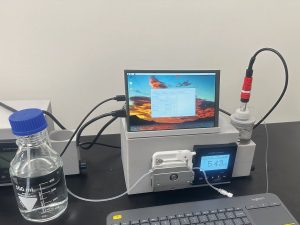
The automatic analyser for volatile fatty acid (VFA) and alkalinity developed by UM researchers
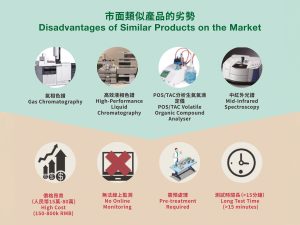
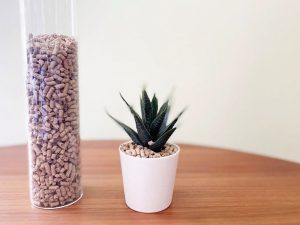
The eco-friendly malted cat litter developed by UM students
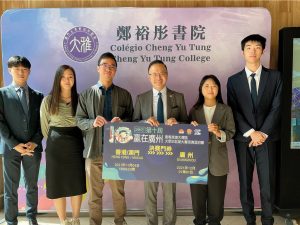
The BioPeTech team, along with Wong Seng Fat and Tang Yu Ming
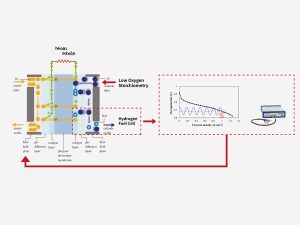
UM develops technologies to enhance the stability of hydrogen fuel cells
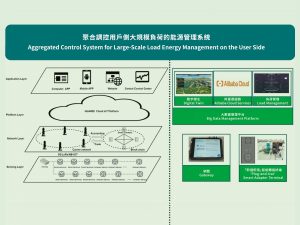
UM has developed an intelligent indoor energy management system
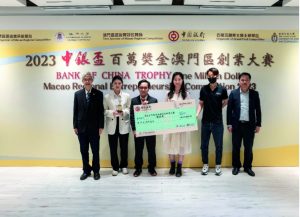
The SEM team members participate in an entrepreneurship competition
